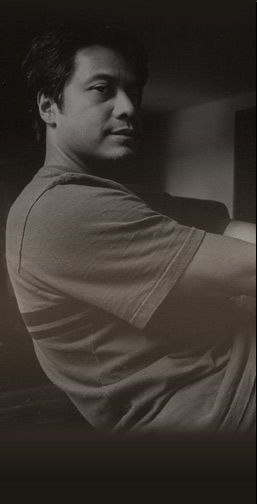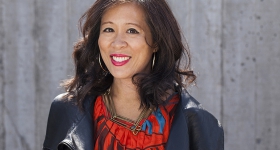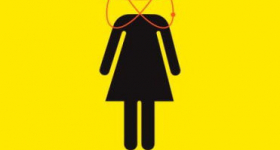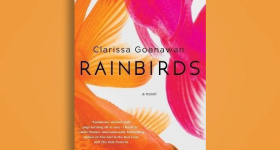Self-perception does not -- and cannot -- exist in a vacuum. It is only fitting, then, that Big Little Man, Alex Tizon’s comprehensive look at Asian American masculinity, bridges geographical, temporal, cultural and interpersonal boundaries in a seamless narrative about what it means to be not just an Asian American male, but a man in every sense of the word. What does it mean to be “man enough” in a modern-day society that is constantly changing its perceived notions of the masculine ideal?
Tizon begins his journey, fittingly, on the island of Cebu (and it truly is a journey, one that spans from explorer Ferdinand Magellan’s skirmish in the Philippines in the 1500s to the author’s adolescent years growing up in the South Bronx in the 1970s to Jeremy Lin’s public tour de force in 2012). He details a trip that he took to his native land as a 29-year-old, and how he was affected by his simultaneous feelings of foreignness (having grown up in the States) and familiarity (he was born in the islands).
“Most of us, when imagining an all-American, wouldn’t picture a man who looked like me. Not even I would,” he writes. “You would have to take my word for it that more than a few times in my life I looked in a mirror and was startled by the person looking back.”
From there, Tizon dives into various layers of the Asian American psyche, touching upon his own parents’ struggles as immigrants forfeiting familiarity in favor of purported opportunities in America, as well as his own exploration of identity as a minority among what his father deems the “Land of Giants.”
His investigation leads him to conclude that any sort of discussion about Asian American males must study both European attitudes of superiority and Asian ideals of what it means to be a man -- side by side. Context is key, Tizon stresses. We are, after all, victims of our circumstances and our narratives only if we allow ourselves to be. Tizon particularly emphasizes the importance of the concept of wen wu, the Confucian belief that a true man should have both brains and brawn, but ultimately be valued for brains over brawn.
“The noblest application of wu, when tempered by wen, was the containment rather than the use of power,” he writes. “Uncontrolled or undisciplined violence was seen as an expression of weakness. Restraint was the ultimate example of strength.” It is because of this ingrained idea of masculinity, he argues, that Asian Americans--both male and female -- so often find their image of Asian American males at odds with what the American ideal says they should be (think John Wayne and western machismo).
Tizon broaches topics ranging from stereotypes of physical inferiority to perceived submissiveness to issues of interracial dating (specifically, what has caused Asian American women to dismiss their male counterparts as simply not “man enough” to date seriously). What is particularly impressive is that what the Pulitzer Prize-winning journalist-cum-professor achieves in breadth, he just as effortlessly presents in depth.
One particularly noteworthy attribute of Tizon’s work is that he interweaves these various threads of history into today’s media tapestry, finding ties between ancient ethics and Asian Americans in the media today. In a chapter titled “Tiny Men on the Big Screen,” for instance, Tizon discusses how the lack of strong Asian American male leads in movies is a kind of “symbolic annihilation.” In other words, he is addressing the damaging, totalizing effects of omission.
“I keep watching movies. I keep flipping on the television,” he writes. “I smile inwardly at the small advances, and I swear under my breath at the embarrassments. I hold my breath just a little every time an Asian man appears in a scene. It’s me up there, Hollywood. Movies and television shows are magic mirrors, and we watch for the reflections that resemble us. They show us who we are. They give us silhouettes of identity so difficult to envision on our own.”

The writer, Alex Tizon (www.alextizon.com)
Tizon’s narrative is effective because he places the predicament of the modern Asian American male in a very solid context: a historical one. His voice is at once laced with introspection and self-deprecating humor (he devotes an entire chapter to measuring his penis size against that of his adolescent best friend Vincent, a “pale-skinned, blue-eyed Jew”), balancing serious concerns with more mundane musings.
And to his credit, he acknowledges that his views are limited to what he has seen with his own two eyes or heard and read through family and friends; he does not pretend to hold the answers to decades-old questions about how to “fix” the Asian American masculinity problem. Rather, the answer -- as it were -- corresponds with that concept of wen wu that so many Asian Americans aspire toward: a strong foundation of knowledge. Brains over brawn, roots before branches.
Filipino nationalist José Rizal once famously said (in much more eloquent terms): “Know history, know self. No history, no self.” What Tizon is proposing to readers through the pages of his prose is not a blind anger toward external forces, but a fully formed understanding of ourselves first -- as Asian Americans, as men, and as part of this ever-evolving narrative of what it means to be, and what it means to not be, a big little man.
***
Joyce Chen is a second-generation Taiwanese American journalist and currently a first-year candidate for an MFA in Creative Nonfiction at The New School in New York City. Her writings have been published in People magazine, Los Angeles magazine and the Los Angeles Daily News.









Comments